Resources
19 February 2023
6:30pm
Doesn't grace encourage sin?
Well, if you’ve been with us, you’ll know that Romans 5 is about being sure where we stand with God; sure that he accepts us now, and that he’ll continue to, through all the ups and downs of our attempts to live for him. And preaching on Romans 5 a while back, I said if you’re trusting in Jesus, then you’re no more accepted by God on the best day of your Christian life, and no less accepted on your worst. Because God’s acceptance of us depends 100% on what Jesus did on the cross, and 0% on anything we do. And someone came steaming up afterwards, very angry, and said ‘You should never preach what you’ve just preached.’ So I said, ‘Why not?’ And he said, ‘Because you’ve just told people it doesn’t matter how they live.’ So I said, ‘No I haven’t. I’ve just told them God’s acceptance of them doesn’t depend on how they live.’ And he said, ‘But it amounts to the same thing.’ So I said, ‘Why?’ And he said it, ‘Because it’ll make people think they can just go out and sin, and then be forgiven.’ And Paul, who wrote Romans, heard that objection a lot. Which is why Romans 6 starts with this question (Romans 6.1):
What shall we say then? Are we to continue in sin that grace may abound?
In other words, can you deliberately keep sinning but trust that God will keep forgiving you? Maybe you’re just looking into Christianity, and that’s one of your questions – because you’ve met people who call themselves Christians, but live no differently from anyone else, and seem to think God is fine with that, which doesn’t sound right to you. And tonight’s Romans passage explains why it’s not. But if you are already a Christian, you need to be able to answer that question. Not only because someone might ask you it, but also because you’ll be tempted to ask it yourself. ‘Can’t I just tell that lie or look at that website or whatever it is – and then be forgiven?’ And tonight’s Romans passage explains why that thinking’s not right, either. So would you turn in the Bibles to page 942, that will get you to Romans 6, and look down to Romans 6.1:
What shall we say then? Are we to continue in sin that grace [God’s undeserved, all-forgiving love] may abound?
If you’re a real Christian, you’ll know the temptation to think that, but you’ll also know the answer is, Romans 6.2:
By no means
In other words, ‘No way!’ And the reason is that:
1. Our old relationship to sin has ended
And that’s Paul’s first point here. If you’re a real Christian, your old relationship to sin has ended. Romans 6.1-2 again:
What shall we say then? Are we to continue in sin that grace may abound? By no means! How can we who died to sin still live in it?
Now sometimes Paul uses the word sin to talk about actions – like the sin of tearing into someone in anger. But in Romans he mainly uses it to talk about the power behind the actions. So after we’ve torn into someone in anger, we might say, ‘My tongue got the better of me. I don’t know what came over me. It was the red eyed monster.’ Which means we’re admitting that behind the action lies a power that can control us. And that’s how Paul mainly uses the word sin in Romans. So just look back to Romans 5.21 – which begins:
so that, as sin reigned…
So Paul talks about sin almost as a person – as a ruler who reigns over us in Romans 6 as a master who enslaves us. And isn’t that true to experience? Because sin (in other words, saying to God ‘I don’t want you ruling my life’) feels like the great act of rebellion and step to freedom. And then you find that, in fact, sin gets the better of you, and you can’t stop or change – and it turns out it was the great step to slavery. So back to Romans 6.1-2:
…Are we to continue in sin that grace may abound? By no means! How can we who died to sin still live in it?
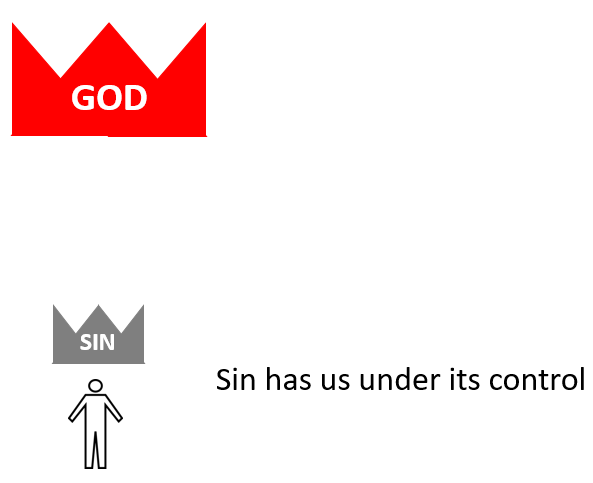
So look at this first picture; the red crown stands for God, the stickperson stands for anyone without Jesus, and the grey crown stands for sin as the ruler or master that has us under its control. That’s how the Bible sees us without Jesus. Which isn’t saying that person is as bad as they possibly could be, and never does any good. But it is saying they’re living in rebellion against God, and they’ve lost the ability, the freedom, to un-rebel. And one symptom of that is sinful habits they’d like to change – but can’t. So without Jesus, sin has us under its control.
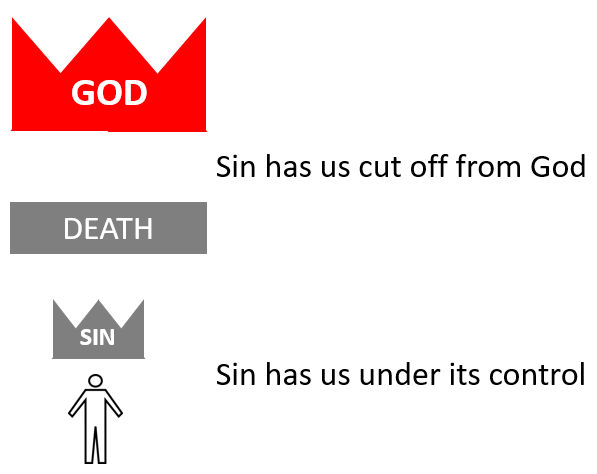
But next picture, without Jesus, sin also has us cut off from God. So there between that person and God is a barrier of separation, because God can’t have us in relationship with him if we won’t treat him as God. And the Bible calls that separation death because death is separation – it ends relationships.
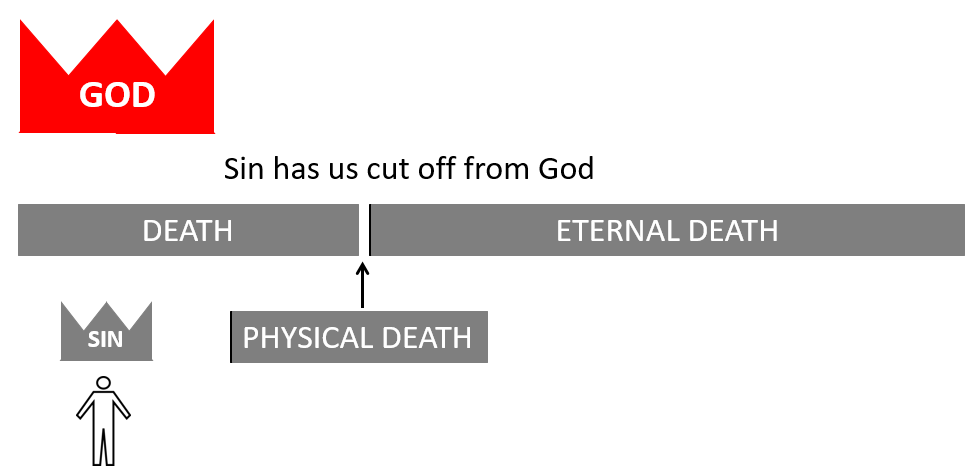
And, next picture, that death between us and God starts now, and without Jesus it will continue through our physical death and become eternal.
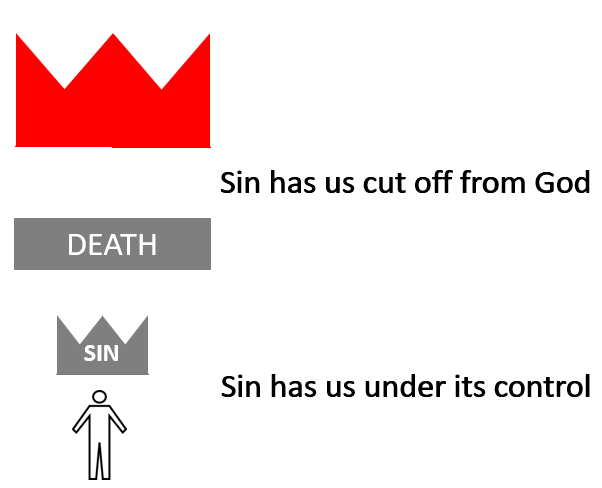
But back to this picture. Here’s how the Bible sees us without Jesus.But look again how Romans 6.2 describes Christians:
…How can we who died to sin still live in it?
So that’s saying Christians have died to sin, and let me say straight up what that does not mean. It does not mean that Christians can no longer be tempted or sin. When I was a young Christian, I met some dangerously misleading teaching on Romans 6.2 that went like this: ‘Imagine you were to die right now. So you’re lying dead on the floor. And now imagine people trying to give you instructions – like, ‘Get up!’ or ‘Walk!’ Well, you wouldn’t respond, because you can’t, because you’re dead. And in the same way, verse 2 says you’re dead to sin (which means you should now be unresponsive to sin) in fact unable to sin.’ And that is dangerously wrong.
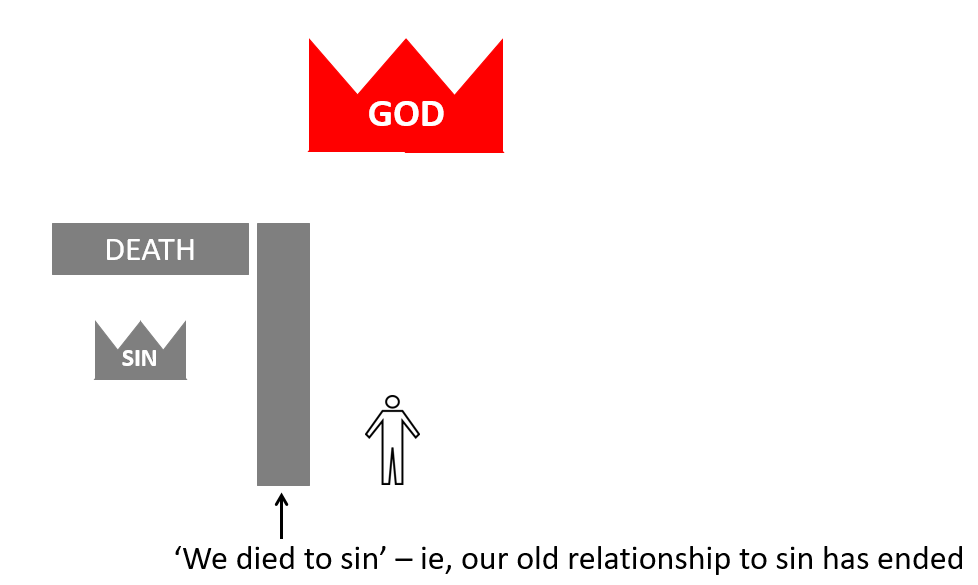
So look at this next picture. When Paul says Christians have died to sin, he’s not talking about our ability to sin – which is sadly intact. He’s talking about our relationship to sin as our ruler or master. And he’s saying, ‘Just like death ends relationships, so your old relationship to sin as your ruler or master has ended.’ So sin is still there in the picture, and can still tempt us and trip us up – as we well know. But it’s lost the power to do those two things which make it our ruler or master.
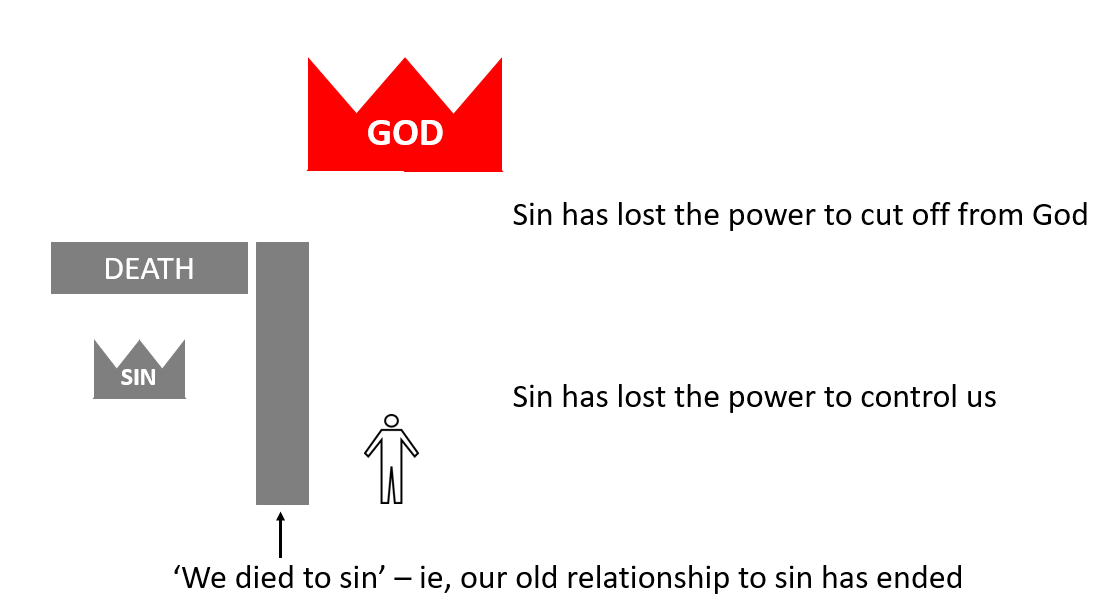
So, next picture: it’s lost the power to cut us off from God – because Jesus’ death on the cross has removed that barrier of death. And so it’s also lost the power to control us (because when we realise what God in his love for us did at the cross, it changes what we want) so that we now want to love him and want not to sin in a way we simply couldn’t without Jesus. So that’s point one: Our old relationship to sin has ended. And point two is how it ended, and Paul says:
2. It ended through us being united with Jesus in his death and resurrection
I know that’s a mouthful and needs explaining – but stick with me. Let’s read again from Romans 6.1-4:
What shall we say then? Are we to continue in sin that grace may abound? By no means! How can we who died to sin [we whose relationship to sin as our ruler or master has ended] still live in it? Do you not know that all of us who have been baptized into Christ Jesus were baptized into his death? We were buried therefore with him by baptism into death, in order that, just as Christ was raised from the dead by the glory of the Father, we too might walk in newness of life.
And if you’re thinking, ‘I get verse 1 and 2, but I’m completely lost again in verse 3 and 4,’ I sympathise. So let’s take it bit by bit. For starters, why does baptism suddenly get mentioned? And why does it sound like it has almost magical power to give you a new life? Well, if you’ve never seen a baptism, we’re doing some two weeks tonight, where I’ll be pouring water on people. And the water of baptism in and of itself does nothing but get people wet. There’s no magical power in it. So imagine I go down to Northumberland Street with my waterbottle, and I creep up on someone, slosh them three times and say, ‘I baptise you in the name of the Father, the Son and the Holy Spirit.’ Would that change their relationship with God? No. It would just get them wet and angry. So Paul is talking here about people who have been baptised and are trusting in Jesus.
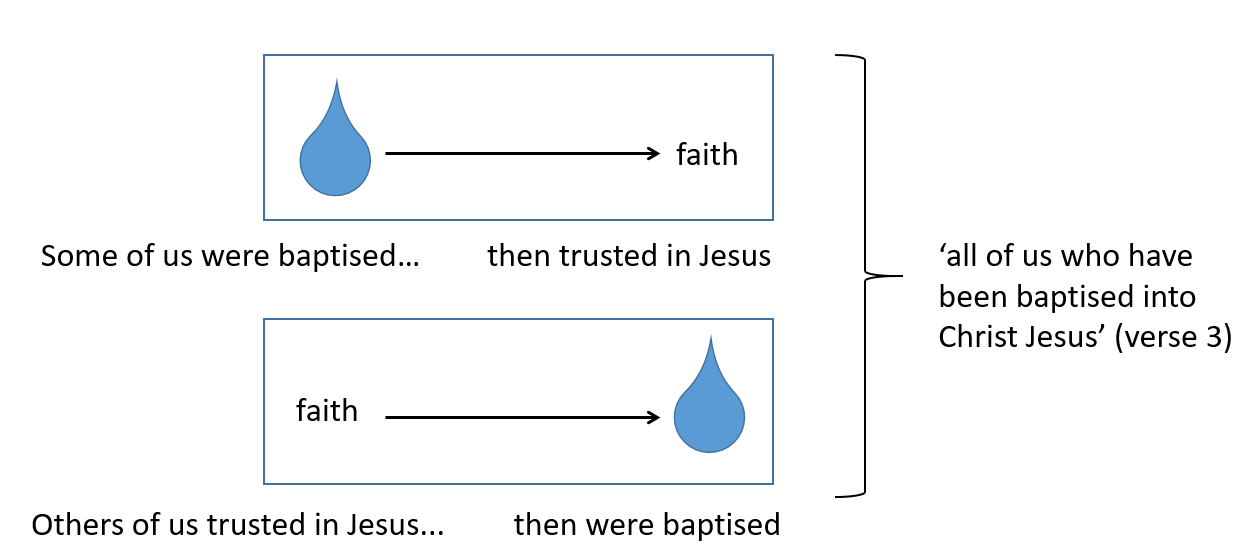
And as this next picture shows, some of us were baptised and then trusted in Jesus. Others of us trusted in Jesus and then were baptised. Which, as Romans 6.3 says, adds up to:
all of us who have been baptized into Christ Jesus
Next up, what does the water of baptism symbolise? And the answer is: if you’ve been baptised and are trusting in Jesus, your baptism symbolised Jesus’ death and your involvement in it. You need to know that in Paul’s day, the word baptism was used literally to describe drowning or sinking. So if someone drowned in a river, the headline would be, ‘Man tragically baptised.’ If the Titanic had sunk back then, the headline would have been, ‘‘Unsinkable’ ship baptised.’ But the word baptism was also used metaphorically for any kind of ordeal. And we still use it like that. So when a football club facing relegation appoints a new manager, and his first match is against Arsenal, the headline is, ‘So and so faces baptism of fire.’ It’s going to be an ordeal. And that’s how the Lord Jesus spoke of his death on the cross. So look at this next picture.
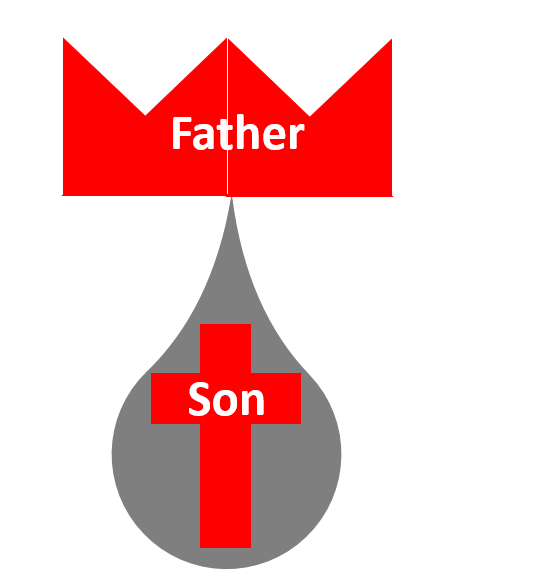
Jesus once said (Luke 12.50):
I have a baptism to be baptized with, and how great is my distress until it is accomplished!
And the baptism was that on the cross, God the Son willingly took our place, and God the Father poured out on him the judgement we deserve – so that we might never face it. But, next picture, the story didn’t end there.
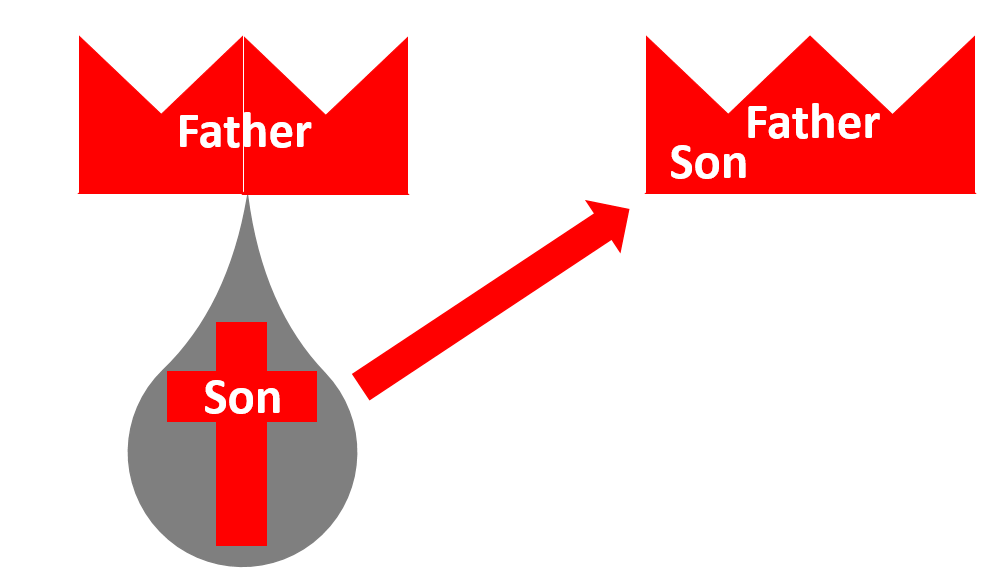
Because Jesus rose from the dead to show that he’d paid for our forgiveness in full, by soaking up in himself that baptism of judgement once and for all. So that’s Jesus’ baptism. What about yours or mine? Well, back to this picture.

That’s you or me without Jesus. But here’s you or me if we’ve been baptised and are trusting in Jesus.

And here’s the thing to get: your baptism symbolised Jesus’ death and your involvement in it.
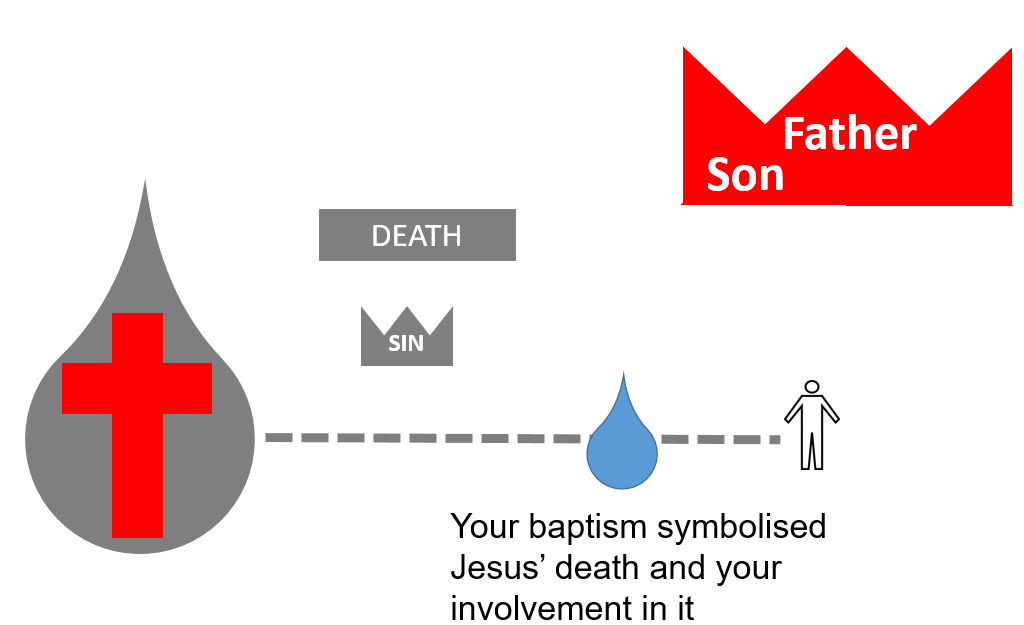
So let’s add in to the picture Jesus’ death, his baptism of judgement for us. And one way of putting it is that your baptism symbolised the results of Jesus’ death being applied to you. So, the forgiveness it paid for, being applied to you; the washing away of sins being applied to you. And Paul certainly says that in other places, but here he says something more mind-bending. He says, your baptism symbolised the way that you were actually involved in Jesus’ death 2,000 years ago on Good Friday. Look at Romans 6.3 again:
Do you not know that all of us who have been baptized into Christ Jesus were baptized into his death?
In other words, our baptisms symbolised Jesus’ death and our involvement in it. Romans 6.4:
We were buried therefore with him
Which sounds like it’s saying we somehow died and were buried with Jesus on Good Friday, or look on to Romans 6.6:
We know that our old self was crucified with him
Which sounds like we were somehow there on the cross with Jesus. Or look on to Romans 6.8:
Now if we have died with Christ
Which sounds like we somehow died with him on Good Friday. Now this is mind-bending, But Paul is saying if you’re trusting in Jesus, then in God’s sight you were there on Good Friday in Jesus. And in Jesus’ death, you and your whole lifetime of sin were taken onto the cross and under the judgement you deserve. And then in Jesus’ resurrection you were brought out from under that judgement once and for all so that it’s not hanging over you today or tomorrow or next week or next year or ever. So if you know that old spiritual that goes ‘Were you there when they crucified my Lord?’ the answer is yes, I was, in Jesus.
Maybe one illustration that helps here is the unborn baby inside Mum. When I first meet new babies here, I sometimes say ‘Is this his or her first time at church?’ Which is a daft question. Because the answer’s ‘No, of course it isn’t. They’ve been coming for the last nine months thanks to being in Mum.’ Because that’s the occupational hazard of being an unborn baby in Mum. Where Mum has been, you have been. Where Mum is now, you are now. Well Paul doesn’t just say Christians are people trusting in Christ. He says they’re in Christ. Just skip to Romans 6.11:
So you also must consider yourselves dead to sin and alive to God in Christ Jesus.
And if you’re trusting in Jesus, that’s where you are, in God’s sight – a bit like the unborn baby in Mum. So in God’s sight, if you’re trusting in Jesus, you were there in Jesus on the cross, having the judgement you deserve poured out on you – only on you in him, so that he sheltered you from it. And in God’s sight, you were there in Jesus when he rose from the dead, so that you’re now beyond that judgement forever. And in God’s sight, where are you now? Well, if Jesus is in glory in his Father’s presence, and you’re in Jesus, then in God’s sight that’s where you are, too. At least in principle, in glory. That’s where you belong. That’s where you’re going, but there’s a time-lag before you get there.
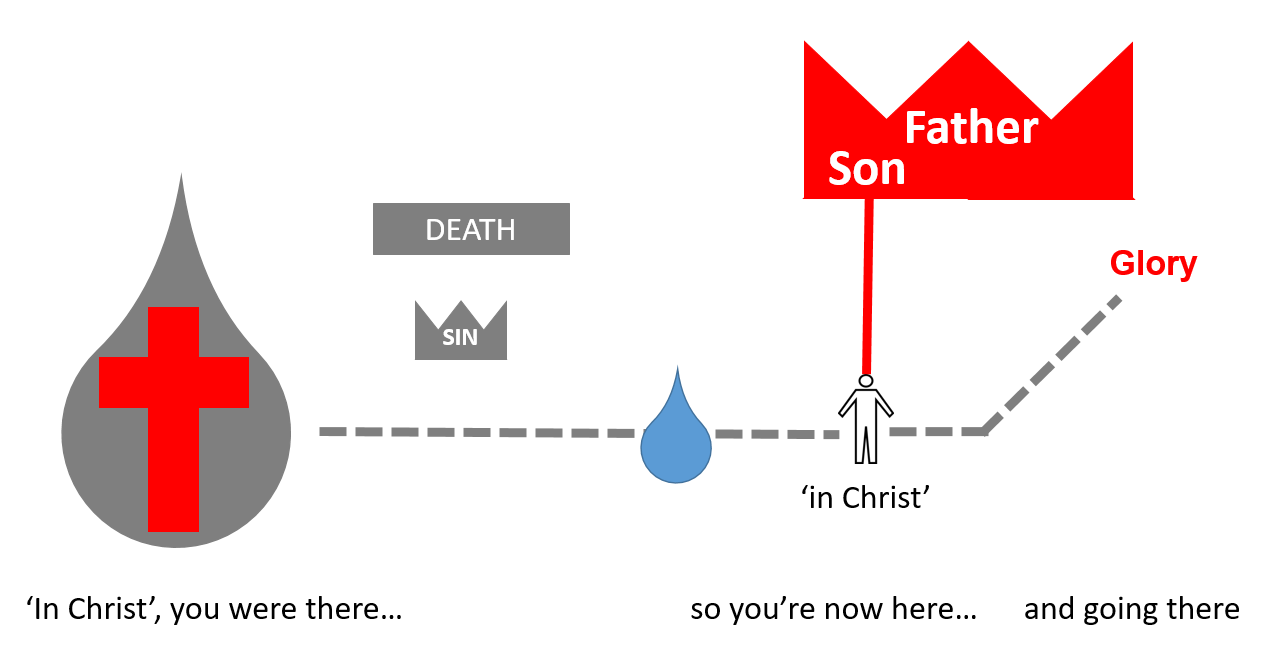
So if you’re in Christ you were there on Good Friday and Easter Sunday. Which means you’re finally going to be with him in resurrected, sinless glory. Now I’ve only really covered Romans 6.1-4, but I’ve given you the gist of the rest – which would take too long. So let me wrap up. The starting question was Are we to continue in sin that grace may abound? And the answer is no because point 1: our old relationship to sin has ended, and point 2: it ended through us being united with Jesus in his death and resurrection. So look down to Romans 6.11 again, which is the punchline – point 3:
3. So what?
Well in the light of all we’ve seen, here’s what Paul wants us to do in the face of temptation and sin:
So you also must consider yourselves [in other words, think of yourselves as] dead to sin
So you’re facing the temptation once again to look at that webpage, or to wallow in bitterness, or to blow up at your family, or whatever it is and Paul says you need to tell yourself you’re dead to sin - which remember, is not saying that your ability to sin has ended. If only! It’s saying that your old relationship to sin as your ruler or master has ended. But sin still speaks to us as if it hasn’t. Last picture.
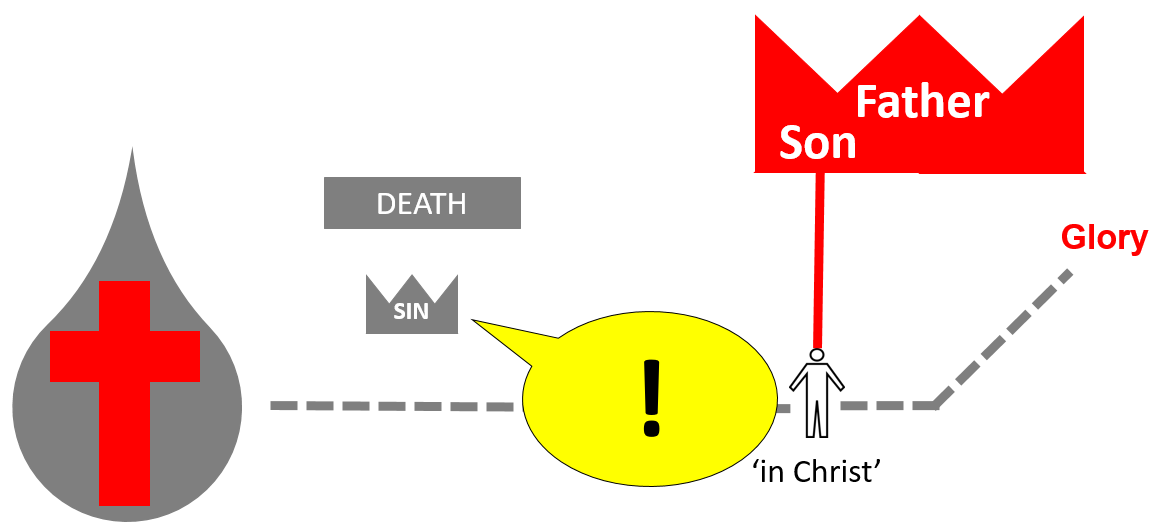
Sin still speaks to us as if we are still under its control. So as we face temptation, sin says ‘You can’t change. You can’t stop this. You’re bound to do it.’ But that’s a lie because realising what Jesus has done for us on the cross has changed what we want and what we’re able to do. We’re not yet able to be sinless but we are now able to resist sin in a way we never could before. So, don’t listen to sin when it tells you you’re still under its control. And don’t listen either to sin when it tells you it can still cut you off from God, because that’s the other things sin still says. It doesn’t just speak to us as we face temptation, it speaks to us after we’ve fallen for it. And it says ‘You’ve blown it now. You can’t relate to God any more. Not after doing that. Not after doing that again. You might as well give up and rejoin me.’
But that’s not true because look again at this picture.

Every sin you or I will ever commit was taken in Jesus to the cross, and that baptism of judgement for it all was poured out on him once and for all, so that it might never reach us. So when we sin, that death-barrier between us and God never returns. I know we feel guilt and regret (which is healthy and right), but when sin tells us those feelings mean God has stopped accepting us, that’s a lie. He continues to accept us even at the point of our worst sin. Romans 6.11 again:
So you also must consider yourselves dead to sin [your relationship with sin as ruler or master is over – it can’t control you any more or cut you off from God any more – so don’t let it tell you otherwise. And the other thing you need to think about yourself is, end of the verse, that you’re] alive to God in Christ Jesus.
So look at this picture one last time. If you’re trusting in Jesus, you’re alive to God in Christ Jesus in the sense that, spiritually, where Jesus is, you are. And since Jesus is alive right now in his Father’s presence and love, that’s where you are right now, spiritually. And it’s where you will one day be in full reality in sinless glory. Which gives us the last thing to say to sin from this passage, because sometimes sin points to our character flaws and sinful habits and disordered desires and identities and says ‘Look, this is the way you are. This is the real you, and you’re never going to be any different. So just give in and be everything you are.’ And the answer is ‘No, those things are not the real me. They’re the fallen me, the sin-spoiled me. And I’m not going to give in, because one day in glory they won’t be part of me at all.’
